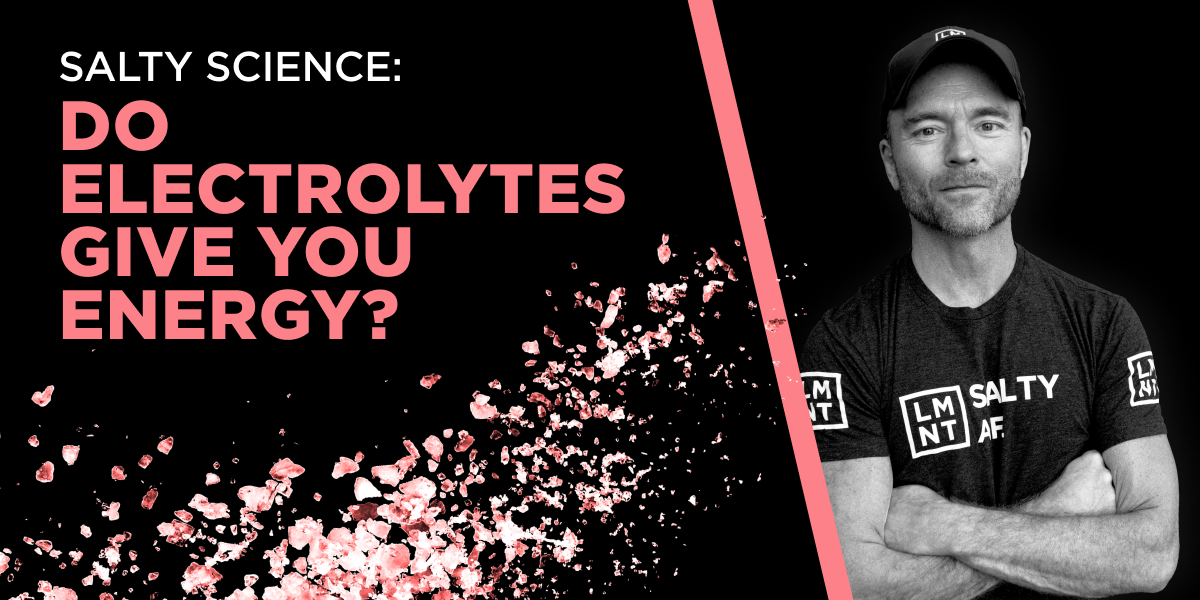“Electrolytes give you energy.” True or false?
It depends on what you mean by energy. No, electrolytes don’t provide protein, fat, or carbohydrates. They aren’t a substance of calories, and they’re not transformed into cellular energy (ATP) via cellular respiration.
But when most people speak of energy, they’re talking about a subjective feeling. They’re talking about feeling sharp and awake. By that definition, the answer is absolutely — electrolytes can help.
Now, obviously many things can sap your energy. If you had a late night, electrolytes aren’t going to shock you to life like a defibrillator. In those situations, a moderate amount of caffeine is your friend. But electrolytes provide something even better.
Electrolytes are the driving force behind energy production in our cells, nerves, and muscles. They help provide stable energy throughout the day — and you feel the difference when you get it right. Not to mention, electrolyte status can influence your quality of sleep.
Suffice it to say that if your body is battling an electrolyte deficiency, your energy will not be optimal. In this article I’ll explain why, including electrolytes’ role in energy metabolism, nerve impulses, hormonal health, fluid balance, and more. Don’t fall asleep on me just yet!
What Are Electrolytes?
Electrolytes are minerals that conduct electrical charges in your body. This conduction of electricity allows the transmission of messages between cells.
This communication happens through a variety of mechanisms, most commonly through potassium channels. Potassium channels (which transport potassium ions) help regulate the beating of your heart, recycle ATP, and much more. They’re critical infrastructure for your nervous system.
Electrolytes also help govern fluid balance, or the maintenance of optimal levels of water in your tissues. Humans are about 60% water by weight, so it’s not surprising that fluid disruptions can affect perceived energy.
The full list of electrolytes includes: sodium, chloride, potassium, magnesium, calcium, phosphorus, and bicarbonate. Sodium and potassium are the key electrolytes for fluid balance, while calcium and magnesium are directly involved in ATP synthesis. I’ll go deeper on that soon.
Your body is well-equipped—thanks to your kidneys and a variety of hormones—to prevent severe electrolyte disturbances. These typically result from medical conditions or aggressive overhydration.
Mild disturbances, however, are more common. For instance, inadequate salt intake after sweaty exercise can cause weakness and fatigue. This is super common in endurance athletes.
What We Mean By Energy
If you’re feeling low energy, that’s a subjective feeling. But when nutrition scientists talk about energy, they’re often talking about adenosine triphosphate (ATP), the energy coin that powers cells.
They might also be talking about calories. A calorie (technically, a kilocalorie) is defined as the amount of energy needed to raise the temperature of 1 kilogram of water by 1 degree Celsius. Practically speaking, calories measure stored energy in food.
Carbohydrates, protein, and fat are called macronutrients because they provide stored energy in the form of calories. The process of unlocking this stored energy is called cellular respiration.
In cellular respiration, cells use both oxygen and nutrients like glucose, fatty acids, and amino acids to create usable energy as ATP. One stage of cellular respiration is called the Krebs cycle.
You might remember the Krebs cycle (also called the citric acid cycle or the TCA cycle) from high school chemistry. It has 8 steps and involves 18 separate enzymes. To avoid putting my readers into a coma, I’ll skip all that and just say this: The Krebs cycle is a method of producing energy from the byproducts of glucose and fatty acids in the mitochondria.
The takeaway is that your body is a complex machine for turning stored energy (food) into usable energy (ATP). And the proper functioning of that machine relies, in part, on electrolytes.
Electrolytes in Energy Metabolism
Electrolytes don’t contain stored energy. Without electrolytes, however, you couldn’t turn stored energy into usable energy.
That’s because electrolytes like potassium, magnesium, and calcium support the complex reactions that produce ATP. Here are a few examples:
- Calcium. Calcium activates a number of enzymes—like pyruvate dehydrogenase phosphatase—crucial for the Krebs cycle.
- Potassium channels. Rising ATP levels stimulate ATP-sensitive potassium channels. (Say that ten times fast). This, in turn, provokes insulin secretion, a hormone that helps you store energy as glycogen or body fat. In other words, how you use energy is dependent on potassium channels.
- Magnesium. Magnesium is a cofactor in many reactions along the ATP production chain. Specifically, magnesium is required to make the MgATP2 complex, a cofactor that activates enzymes needed to synthesize ATP. Magnesium also regulates both potassium and calcium channels that influence energy metabolism.
Don’t worry, there won’t be a quiz on this stuff. Let’s take this beyond ATP now.
Electrolytes and Subjective Energy
Electrolytes support an impressive number of functions in the human body. These functions include:
- Regulating energy metabolism (the prior section)
- Conducting electricity to power the nervous system
- Producing and regulating hormones like cortisol, adrenaline, aldosterone, and antidiuretic hormone
- Maintaining fluid balance
- Regulating blood pressure
- Regulating muscle contraction (including heartbeat)
- Promoting restful sleep
- And much more
Many of these functions directly or indirectly affect the subjective state we call energy. Let’s look at several more closely.
Nervous system health
For nerve cells to communicate—including brain cells—you need electrolytes like sodium and potassium. They conduct the messages. Imbalances in sodium, for instance, cause a host of neurological symptoms including headache, fatigue, and lethargy.
Hormonal Health
Hormones are chemical messengers that tell your cells what to do. As you probably know, unbalanced hormones can throw off your energy.
Electrolytes (especially sodium) regulate many hormones that factor into subjective energy. Consider that sodium deficiency can:
- Elevate cortisol, your stress hormone. To be clear, cortisol isn’t a “bad” hormone. It helps you wake up in the morning. But imbalances in cortisol are a common cause of what folks call “burnout” or “adrenal fatigue”.
- Elevate adrenaline and noradrenaline, stimulating hormones that can impair sleep.
- Impair the secretion of antidiuretic hormone (ADH), causing increased nighttime bathroom breaks. This can affect sleep and therefore subjective energy.
Why do you think I’m always telling folks to stay salty?
Fluid balance
Most people are confused about hydration. They think it’s just about drinking water, but it’s not.
It’s about maintaining fluid balance. And maintaining fluid balance inside and outside your cells depends on both water and electrolyte status.
Leaving electrolytes out of the equation can be dangerous. Many distance athletes, for instance, fall victim to the headaches, low energy, confusion, and fatigue borne of low sodium levels. Why? Because they drink too much sodium-free water. They neglect electrolytes.
Low Sodium = Low Energy
I see a lot of low sodium (and low energy) in the low-carb community. Low-carbers tend to be short on sodium because:
- They aren’t eating salty foods
- They’re losing more sodium through urine
The resulting symptoms are low-energy, fatigue, headaches, cramps, and insomnia. It’s often called keto flu, but it’s actually low-sodium flu.
When you bump up the sodium, the energy comes back nicely. Let me share an anecdote to illustrate.
Years ago, before I created Drink LMNT, I noticed my energy was starting to wane during jiu-jitsu training. I thought maybe it was age-related. I assumed my low-carb nutrition was perfectly dialed in, so I didn’t tinker much.
But when I mentioned my energy issues to my coaches, they gave me the following advice:
Get more electrolytes. Especially more sodium.
It took me about a year, but I listened. And when I did, I immediately realized I should have listened sooner. Just a couple more daily grams of sodium made a HUGE difference for me on the jiu-jitsu mat.
I believe electrolytes can be a game changer for a huge number of people. That’s why I’ve become a cheerleader for these minerals lately.
Do Electrolytes Give You Energy?
Yes and no. Electrolytes don’t provide calories, but they do support a range of processes that affect energy levels.
Electrolytes aren’t an energy booster per se, but a lack of electrolytes will sap your energy.
Let me repeat that in a slightly different way. Getting enough electrolytes doesn’t guarantee good energy. But if you’re low on electrolytes, you’re guaranteed to feel less than 100%.
Prevent that from happening by eating electrolyte-rich foods and hydrating with water plus electrolytes.
Get your electrolytes handled. It’s a small practice that can have a big impact.

